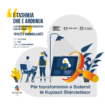Kosovo – A short profile
Positioned in the Southeastern Europe, Kosovo is the newest country in Europe, declaring its independence from Serbia in the year 2008. With a land area of 10,900 km2, Kosovo has a population of 1.8 million, of which 38 percent is under 19 years of age (World Bank, 2015).
The war in Kosovo left the economy of the country in its poorest condition. Years following the end of the war, found Kosovan political leaders establishing a stable political structure, which was the first most important step to be taken, and preparing steps for declaring the Independence. Since then, economic development has become a major goal.
For Kosovo, one of the main economic development indicators is agriculture. According to a study taken by Arcotrass GmbH and financed by the European Commission (2005), agriculture is one of the most important sectors of economy of Kosovo, contributing around 25% of GDP, alone. According to the same source, food has the highest proportion of total household expenditure, while 50% of agriculture production is consumed on the household.

Moreover, statistics taken from MAFRD estimates (2005), SOK Agriculture Household Survey (2005), UNMIK Customs Service (2005), and Labor Market Statistics Survey (2003/2004), show that agriculture is an area that shows promising potential economic growth and job creation for Kosovo. The above table provides us with key agricultural indicators in Kosovo and European Union (EU). From the total land, which is estimated to be 858,063 ha, 369,269 ha or 43% is agricultural land. Moreover, we can see that the share of agricultural labor in total labor is 49%, which means that almost half of the population is focused on agriculture activities.
Relatively good climate and the supply of agricultural labor are some of the main elements that give Kosovo a comparative advantage in the production of diary and high-value horticultural products (World Bank, 2015). Moreover, taken from the same report, if we compare the average agricultural land per person in Kosovo to the one in EU, in Kosovo the average is considerably lower (0.15 – 0.18 hectares).
From the estimated total population of Kosovo, the working age population is slightly higher than 1.2 million (Kosovo Agency of Statistics, 2015). From the same statistics, we see that from the labor force only 500,251 are active persons, while the rest are inactive (702,238), meaning that they are not employed. Of those people that are active, 35.3% are unemployed and 64.7% are employed, yielding an employment rate of 26.9%. Moreover, among people from 15 – 24 of age, 61% are unemployed. These statistics show a high working potential, if human resources are meticulously allocated and employed.
Customs tariffs in Kosovo for imported goods are 0% for goods coming from Serbia and Montenegro, 1% for goods coming from Macedonia and Albania (according to the free trade agreement), and 10% for goods imported from all other countries, including European Union (EU) countries. For all exported products Kosovans are issued a customs tariff from all the countries, including EU countries. The only countries that Kosovo is not issued a customs tariff are Serbia, Montenegro, Macedonia and Albania due to the free trade agreement.
What are the actions that the Kosovan government should take?
Economy remains one the greatest challenges to be addressed. A friendly business environment is the main catalyst that would solve many of the socioeconomic problems that the new born nation is currently facing. Among changing the working profile and standards of some current large corporations and the new start-up companies through strategic management, there are two other main problems that need utmost attention: the distorted capital market and the informal activity.
The deficit of production businesses in Kosovo has created an unpleasant situation in Kosovo market system, leading to low exportation – increased importation of goods, lack of cash flow, low income saving, and high rate of unemployment, thus creating a distorted capital market. An important question is why do we not have more production businesses? The first reason is low incomes which ultimately lead to no savings. People with low income are incapable of saving money to invest in any major production businesses. Most of the money that comes from salaries, if not all of it, goes to day to day living expenses. Among rent, housing expenses, transportation expenses, and other living expenses – a considerable amount of money goes to paying the prices of most imported goods available in Kosovo market which are more expensive than in any other regional country. The second reason is lack of loans available for production businesses from commercial banks. Due to the low risk, most of the loans in Kosovo are given to trading businesses, which besides the increased cash flow; these trading businesses do not have a high impact in Kosovan economic growth. Providing loans only to trading businesses does not ensure full employment of available resources and usage of these resources efficiently.
Kosovo government should highly focus on improving agriculture sector in order to gain from the competitive advantage that it has on diary and horticultural products. The most important step should be the elimination of the informal activities taking place in this sector, as in all other sectors as well. The legal economic activities taking place in Kosovo without the information of Kosovan government is playing a major role in creating a misbalanced business market. Even though informal activities remain evident in all countries, emerging transition economies – such is Kosovo, face such activities considerably higher due to economic transitions from one ideology to another totally different from it. As such, in Kosovo, informal activities occur in different forms; mainly starting from unregistered small businesses to large firms which do not provide their workers with written official contracts in order to avoid taxation, and to street merchants who do not pay taxes at all.
In order to address this issue properly, it is important to first – determine what causes informal activity, second – know the economic costs caused from it, especially to entrepreneurs, and third – develop strategies to eliminate it. There are plentiful reasons why informal activity takes place, but they differ from country to country, depending on how long the past regimes had lasted; the longer the regime had lasted the longer the transition will last and the longer it will take for a country to overcome informal activity, since certain communist believes have been embed to the people of those countries and have become part of their mentality.
Even though there are not standardized policies which assure elimination of informal activity, every emerging country, in this case also Kosovo, should have a close look at the policies that countries with the same situation had taken to decrease informal activity to a minimum. Since informality takes place in different forms, Kosovan government should make or even adapt policies that would best fit the situation in Kosovo. The government of Kosovo should mainly target all businesses holding undeclared or undocumented workers, especially in small businesses in agricultural sector. In order to successfully do so, the government of Kosovo should unify VAT collections and social contributions for all small businesses in the field of agriculture, trade, services, and manufacturing, which possess 80% of their register book. This program would make workers’ contributions proportional to the businesses’ profit, accordingly eliminating any motivation for them to go informal. Such an action would make every small business and new entrepreneur declare their profits and document all their workers.
The second most important step is for the government of Kosovo is to concentrate on improving technology for agriculture sector. Most updated technology would enable farmers to successfully allocate their resources to achieve maximum output. Moreover, besides the improvement in quality, Kosovan farmers will also be able to compete in the international market with the quantity produced. Thus, besides fulfilling the domestic needs, Kosovan agriculture companies would be able to export more to the Balkans countries.
European Union and International Trade
Considering international trade as one of the main pillars for economic growth, European Union has managed to achieve a strong position in the global trade. That is reached thanks to a strong collaboration between EU members which act together as one voice on the global stage and trade policies that all EU members obey among each other and other non-EU countries.
As one of the most powerful engines for economic growth and job creation, an important attention has been paid by European countries to international trade. Therefore, every EU member country is excluded from customs tariffs when trading among each other, thus making Europe as one big trading market for all the members.
There is a common policy on international trade and investment that all EU Member States have agreed to follow. These policies enable EU Member States to unitedly act on trade negotiations, thus, maximizing their influence (European Commission, 2015). Moreover, these Member States are also presented by the Commission at the World Trade Organization (WTO). Moreover, in the year 2013, EU started negotiating free trade agreements with two main partners, U.S. and Japan, aiming not only to remove tariffs and open markets for investments but also for services and public procurement (European Commission, 2015).
All these actions have made EU market the largest economy in the world with a GDP of € 13,920,541 million (European Union, 2011). Even though EU Member States account for only 7% of the world population, EU is responsible for 20% of the world’s imports and exports. EU accounts for 16.4% of global imports, while 15.4% of global exports. Most importantly, all EU Member States benefit from the joint venture enabled by EU in the international trade market.
What would Kosovo benefit from joining European Union?
There are three main benefits that Kosovo would have from joining European Union:
- Kosovo becomes part of the largest economy in the world. Kosovo would become an open market and determinant in fulfilling the economic conditions which come from the pressure of older experienced economies. Moreover, having a comparative advantage in the production of diary and high-value horticultural products, Kosovo would be able to export these products with no exporting costs to any EU Member State that is in need of them.
- Trade relations: Joining EU enables Kosovo to ease the flow of people, goods, and services across borders, eventually decreasing net inefficiency,
- Political Stability: As one of the fundamental conditions to join EU is to ensure that the applicant country ensures stable democratic political institutions and human rights, which includes rule of law and respect for minorities.
Why should Kosovo be open to International Trade?
Joining European Union is a process that cannot be achieved over night, considering that it is a long and complex process. However, Kosovo should not wait until it becomes an EU member to take the necessary steps to open its market to international trade.
Lowering tariffs on imports tends to lead to higher living standards and economic growth, as evidenced by the prosperity observed in many countries with low tariffs. Moreover, such an action provides countries with the opportunity to make their economies more competitive and efficient, especially in the long run. However, lower tariffs unavoidably bring some losers and winners. And, this can be the case for both developed and developing countries.
Even though there are high potential benefits that come from lowering tariffs in the long-term, the short-term adaption costs can be greater if there is no protection at all, especially if a country is at the beginning stage of its existence. Yet, having a government that fully relies on tariffs for government revenue can create considerable macroeconomic instability. Therefore, governments (especially of the developing countries) must meticulously design policies that provide both long- and short-term benefits to its citizens.
When Prime Minister Trudeau was asked ‘why he decided to have a half-female cabinet’, he answered, “Because it’s 2015” (Murphy, 2015). I found this short answer very interesting and appropriate. And, if someone would ask me today why developing countries need open markets and more trade agreements, I would say “Because it’s 2016”. Nowadays, trade simply means cooperation, development and integration. Developing and developed countries should continuously reform their trade policies in order to boost economic growth and social development. Even the young and small countries like Kosovo, eight years after the independence, should implement trade policies that enhance cooperation with other countries and opens the doors for free exports and imports.
There are six fundamental arguments why Kosovo should open its doors to International Trade:
Argument 1: Firstly, open markets and trade agreements would help Kosovo’s economy grow faster, and any protectionist measure might only lead this country to stagnation. Why?! According to the World Bank data, Kosovo’s population is 1.83 million. From the economics point of view, we can realize that consumer market within this country is very small. From the trade point of view, we realize that with open market Kosovo cannot import a lot.
However, trade agreements with other countries means that Kosovo can also export as much as it has potential, as long as it has a comparative advantage in a particular industry. To make it even simpler, I can see trade as an opportunity for Kosovo to import all the most demanded products and most advanced/innovative ones (especially technological products), and export all those products which companies in Kosovo can produce more efficiently.
If you just take a look at some simple statistics, you might realize why trade should help Kosovo develop. This small country is in Europe, in the area where four out of eight G8 economies are located (Germany, France, Italy and Great Britain). And, possibility of doing trade with these large economies is very high and important. Moreover, Kosovo also has the youngest population in Europe, which is a very promising indicator for development. According to the World Factbook, 43.6 % of Kosovo’s population is under the age of 24.
Argument 2: As a democratic country, Kosovo’s main long term goal is European Integration. Thus, especially since 2008, this country has been continuously working on fulfilling the European Union legal, political and economic criteria in order to join this family of nations. And, the main economic criterion is to establish a trade policy package that promises open markets, which includes trade freedom, investment freedom, and financial freedom. And, in order to join European Union, for Kosovo is mandatory to implement policies that will fulfill these economic criteria.
Argument 3: Foreign direct investment highly contributes to the economic development of a country. Trade freedom attracts international investors and gives them the possibility of investing in a country where they see production might be cheaper and more efficient. In this case, recalling some statistics from Kosovo, such as the large percentage of agricultural land, democratic country, young population, cheap labor, and low VAT, are definitely some of the key promising and attractive indicators for potential international companies to invest in this country. Foreign Direct Investments (FDI) increase production and export in a country; they increase GDP and budget; and they definitely decrease unemployment and poverty.
Argument 4: As also the European Commission claims, trade encourages innovation. It does so by ‘facilitating exchange of know-how, technology and investment in research and development, including through FDIs’. Open market implicitly means ‘one market’. Thus, people, especially entrepreneurs, tend to identify what service or product is needed and demanded more in the market. And, by using technology, and maybe cooperating with research and development centers or departments, they come up with innovative products and services.
Argument 5: Consumers in developing countries benefit a lot from trade. Firstly, it provides them with varieties of products. Secondly, trade boosts competition, and competition leads to lower prices. Thus, consumers are also able to buy products with lower prices and higher quality.
Argument 6: Trade strengthens relations between countries. It brings people together in peaceful and mutually beneficial exchanges. Consequently, it contributes to peace and stability. Trade cooperation with a country with no doubt boosts political and social cooperation. For instance, if two countries trade a lot, with no doubt their interest in each other is higher, relative to other countries. Consequently, politicians try to do their best in order to keep and advance that cooperation. Many times, these countries help each other even in international politics. And from the social perspective, I also believe that trade and politics brings citizens of those countries together.
Conclusion: These are all indicators why Kosovo must open its doors to international trade. Yet, one thing must be highly understood; trade alone cannot guarantee the economic development. The trade policies that Kosovo government should design must be complementary with policies of other areas so that the costs of lowering tariffs can easily be compensated by FDIs. Moreover, labor reforms must also take place in order to smooth the movement of labor from decreasing to growing sectors while helping workers face or adapt the change through proper education.
According to Anthony Kleitz from Organisation for Economic Co-Operation and Development (2008), there are certain steps that are recommended for governments to adopt in order for them to easily deal with structural adjustment. The first and the foremost step is to design macroeconomic policies that encourage economic growth and stability, followed by labor policies that encourage the development of human skills. The third step is to create a fair competition environment which emboldens the entry of new business. The fourth step is to create a supportive framework and design liberal investment and trade policies.
These are all steps that Kosovan government can follow in order to decrease the burden that comes with designing beneficial long-term policies while not excluding the short-term policies as well.
References
- (2006, December). Kosovo: Report – Study on the State of Agriculture in Five Applicant Countries. Retrieved April 21, 2016, from http://ec.europa.eu/agriculture/external-studies/2006/applicant/kosovo_en.pdf
- (2016). The World Factbook: Kosovo. Retrieved April 23, 2016, from https://www.cia.gov/library/publications/the-world-factbook/geos/kv.html
- (2013). International trade. Retrieved April 19, 2016, from http://ec.europa.eu/economy_finance/international/globalisation/international_trade/index_en.htm
- (n.d.). The economy. Retrieved April 19, 2016, from http://europa.eu/about-eu/facts-figures/economy/index_en.htm
- K., S., & L. (2015, June). Results of the Kosovo 2014 Labour Force Survey. Retrieved April 19, 2016, from http://www-wds.worldbank.org/external/default/WDSContentServer/WDSP/IB/2016/03/18/090224b082ff4883/1_0/Rendered/PDF/Results0of0he0labour0force0survey0.pdf
- Murphy, Jessica. “Trudeau Gives Canada First Cabinet with Equal Number of Men and Women.” The Guardian. Guardian News and Media, 2015. Web. 25 Apr. 2016.
- (2008, May). Making Trade Work for Developing Countries. Retrieved April 23, 2016, from http://www.oecd.org/trade/40672245.pdf
- (n.d.). Customs. Retrieved April 19,2016, from https://www.rks-gov.net/en-US/Bizneset/FinancatTaksatDoganat/Pages/Doganat.aspx
- (n.d.). Kosovo. Retrieved April 23, 2016, from http://data.worldbank.org/country/kosovo. Data may be updated over time.
- (2016, April 21). The World Bank Group in Kosovo: Country Snapshot. Retrieved April, 2015, from http://www.worldbank.org/content/dam/Worldbank/document/eca/Kosovo-Snapshot.pdf







